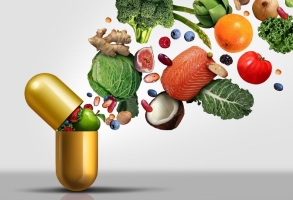
Many migraine sufferers have found relief with new pharmaceutical treatments, however numerous natural supplements and vitamins can be effective alternatives. World-renowned headache specialist and researcher, Dr. Fred Cohen, advocates for patients who prefer non-prescription solutions.
“While anti-migraine medications can be life-changing for patients, there are side effects and some individuals do not benefit from or tolerate these recommended drugs,” said Dr. Fred Cohen, Assistant Professor of Medicine and Neurology at the Icahn School of Medicine at Mount Sinai in New York. “Headaches have plagued people since ancient times, so natural remedies were the only option and are still recognized today.”
Dr. Cohen notes that cannabis has been used to cure headaches and chronic pain for hundreds to thousands of years. Active compounds in cannabis, such as THC (tetrahydrocannabinol) and CBD (cannabidiol), interact with the body's endocannabinoid system, which plays a key role in regulating pain, mood, and sleep. THC can provide pain relief and reduce nausea associated with migraine attacks, while CBD is known for its anti-inflammatory and pain-relieving properties without the psychoactive effects.
“Cannabis has been explored as a treatment for migraine attacks due to its potential multifaceted effects on the body's pain perception and inflammatory processes,” said Dr. Cohen. “Several recent studies have signaled that medical marijuana can be an effective acute migraine treatment.”
Dr. Cohen points to a recent clinical trial, Vaporized Cannabis versus Placebo for Acute Migraine: A Randomized Controlled Trial, which reported marijuana to be superior to placebo in the acute treatment of migraine. A study in 2022, Efficacy and Safety of Medical Marijuana in Migraine Headache: A Systematic Review found medical marijuana results in long-term reduction of migraine frequency in more than 60% of treated patients and is associated with less disability and lower anti-migraine medication.
Additionally, natural supplements and vitamins can prevent or reduce symptoms. Popular supplements include magnesium, vitamin B2 (riboflavin), and Coenzyme Q10:
Magnesium is believed to be effective in reducing migraine frequency by affecting neurotransmitter release and blood vessel constriction, along with stabilizing brain neurons, to prevent the overexcitation that often leads to migraines. Green leafy vegetables, such as spinach, legumes, nuts, seeds, and whole grains are rich in magnesium, with various forms like magnesium oxide, citrate, and glycinate available. Dr. Cohen cites a link between magnesium deficiency and increased migraine attacks.
Coenzyme Q10 (CoQ10) supports migraine management by improving mitochondrial function and energy production within cells, potentially addressing underlying cellular energy imbalances associated with migraines. Studies have demonstrated that supplementation with CoQ10 can lead to a decrease in migraine attacks.
Omega-3 fats, in addition to improving “good” cholesterol levels, have been shown to reduce migraine frequency and intensity. Their anti-inflammatory properties may decrease the production of prostaglandins, substances that can trigger migraines.
Feverfew and butterbur, both of which are herbal supplements, are believed to prevent migraine attacks by reducing inflammation and possibly inhibiting the release of blood vessel-dilating substances in the brain.
Diets such as the Mediterranean, plant-based, and gluten-free, among others, have been found to potentially decrease the frequency of headaches and migraines. Lifestyle changes including proper sleep, regular exercise, and managing stress and allergies, can also play a part.
"Just as each individual's headache triggers are unique, so too are their treatment choices,” concludes Dr. Cohen. “I fully support my patients who seek natural solutions.”
As a life-long headache sufferer, Dr. Cohen is committed to helping others break free of pain. For more information visit Dr. Cohen’s website and follow him on Twitter, Instagram and TikTok.
About Dr. Fred Cohen
Fred Cohen, MD, is one of the few headache specialists in the U.S. trained in both Internal Medicine and Headache Medicine. Based in New York, NY, the world-renowned Headache Specialist is Assistant Professor of Medicine and Neurology at the Icahn School of Medicine at Mount Sinai. Dr. Cohen is Assistant Editor of Headache: The Journal of Head and Face Pain and Current Pain and Headache Reports. His research and expertise have made him a highly sought after presenter at headache conferences around the world. For more information visit www.fredcohenmd.com.